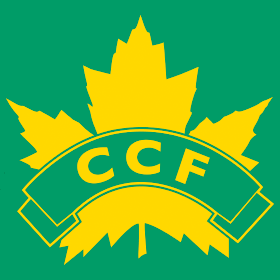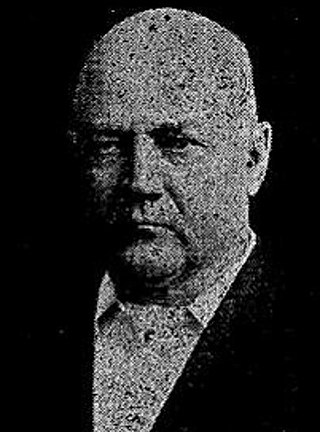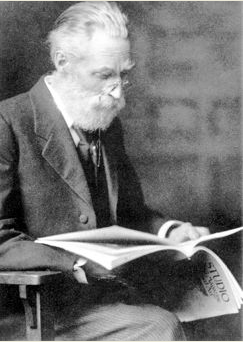
The Co-operative Commonwealth Federation was a federal democratic socialist and social-democratic political party in Canada. The CCF was founded in 1932 in Calgary, Alberta, by a number of socialist, agrarian, co-operative, and labour groups, and the League for Social Reconstruction. In 1944, the CCF formed one of the first social-democratic governments in North America when it was elected to form the provincial government in Saskatchewan.
There have been various groups in Canada that have nominated candidates under the label Labour Party or Independent Labour Party, or other variations from the 1870s until the 1960s. These were usually local or provincial groups using the Labour Party or Independent Labour Party name, backed by local labour councils made up of many union locals in a particular city, or individual trade unions. There was an attempt to create a national Canadian Labour Party in the late 1910s and in the 1920s, but these were only partly successful.

The Socialist Party of Canada (SPC) was a political party that existed from 1904 to 1925, led by E. T. Kingsley. It published the newspaper, Western Clarion.
The Social Democratic Party was a social democratic political party in Canada founded in 1911 by members of the right wing of the Socialist Party of Canada, many of whom had left the organisation in May 1907 to form the Social Democratic Party of British Columbia. These members were dissatisfied with what they saw as that party's rigid, doctrinaire approach. As opposed to the Socialist Party of Canada, the SDP allowed minority language groups ample room for self-determination, which led to a perception that the ethnic groups were more dominant than the overarching SDP. When the authorities cracked down on ethnic groups during the 1918 wave of repression, many of the individual ethnic chapters were shut down.
The Socialist Labor Party was a political party in Canada that was formed in 1898 by Canadian supporters of the ideas of American socialist Daniel De Leon and the Socialist Labor Party of America. It became a national party in the 1930s and had its headquarters in Toronto. The party never won any seats. The party ran only a small number of candidates, all of whom placed last in their respective elections.

J. S. Woodsworth was a Canadian Methodist minister, politician, and labour activist. He was a pioneer of the Canadian Social Gospel, a Christian religious movement with social democratic values and links to organized labour. A long-time leader and publicist in the movement, Woodsworth served as an elected member of the federal parliament from 1921 until his death in 1942. In 1932, he helped to found the Co-operative Commonwealth Federation (CCF), a socialist political party which was the predecessor to the New Democratic Party (NDP).
The Manitoba Labour Party (MLP) was a reformist, non-Marxist labour party in Manitoba, Canada. It was created in early May 1910 as a successor to the province's second Independent Labour Party (1906–08). Former Member of Parliament Arthur Puttee was a leading MLP organizer. The party fielded one candidate in the 1910 provincial election, and also ran candidates at the municipal level.
The Socialist Party of Manitoba (SPM) was a short-lived social democratic political party launched in 1902 in the Canadian province of Manitoba. The organisation advanced a moderate programme of social reform legislation. In 1904 the SPM became one of the constituent units founding the Socialist Party of Canada, an organisation which continued until 1925.
The Trades and Labor Congress of Canada was a Canada-wide central federation of trade unions from 1886 to 1956. It was founded at the initiative of the Toronto Trades and Labour Council and the Knights of Labor. It was the third attempt at a national labour federation to be formed in Canada: it succeeded the Canadian Labour Union which existed from 1873 to 1877 and the Canadian Labour Congress which held only one conference in 1881.
The Socialist Party of British Columbia (SPBC) was a provincial political party in British Columbia, Canada, from 1901 to 1905. In 1903, the SPBC won seats in the Legislative Assembly of British Columbia.

Socialism in Canada has a long history and along with conservatism and liberalism is a political force in Canada.

E.T. Kingsley was a founder and leader of the Socialist Party of Canada (SPC) and editor of Western Clarion, the SPC's official publication in early twentieth-century Canada.
The Socialist Party of Canada (SPC) is a socialist political party in Canada, affiliated with the World Socialist Movement.

William Arthur (Bill) Pritchard was a Canadian Marxist labour activist, organizer, editor, journalist, and politician. A major figure in the One Big Union movement, he also was one of the defendants in the 1920 sedition trial of leaders of the 1919 Winnipeg General Strike. Pritchard later was elected reeve (mayor) of Burnaby, British Columbia during the Great Depression and played an instrumental role in founding the BC Co-operative Commonwealth Federation.

Maternal feminism is the belief of many early feminists that women as mothers and caregivers had an important but distinctive role to play in society and in politics. It incorporates reform ideas from social feminism, and combines the concepts of maternalism and feminism. It was a widespread philosophy among well-to-do women in the British Empire, particularly Canada, from the late 19th century until after World War I (1914–18). The concept was attacked by later feminists as accepting the paternalist view of society and providing an excuse for inequality.

Richard Parmater (Parm) Pettipiece was a Canadian socialist and publisher. He was one of the founders of Socialist Party of Canada, and one of the leaders of the Canadian socialist movement in British Columbia in the early 20th century. Later he moved into the moderate trade union movement, and for many years was a Vancouver alderman.
George Weston Wrigley (1847–1907) was a Canadian journalist and social reformer. He was a believer in the Social Gospel and was an opponent of industrial capitalism, which he blamed for many social ills. He was the editor of several newspapers that promoted reform in the later part of the 19th century.

The Western Clarion was a newspaper launched in January 1903 that became the official organ of the Socialist Party of Canada (SPC). At one time it was the leading left-wing newspaper in Canada. It lost influence after 1910–11 when various groups broke away from the SPC. During World War I (1914–14) the Western Clarion was internationalist and denounced a war in which workers fought while others profited. Following the Russian Revolution it adopted a pro-Bolshevik stance, The paper was banned in 1918, but allowed to resume publication in 1920. Its circulation dwindled as SPC membership dwindled, and the last issue appeared in 1925.

Thomas Phillips Thompson was an English-born journalist and humorist who was active in the early socialist movement in Canada.









